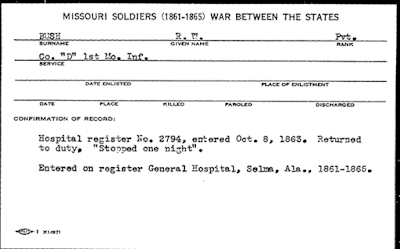Recently I worked on a podcast episode of an ancestor with a common name who moved frequently. Boy, did it generate questions. We all have that ancestor with a common name leaving descendants to find clues before attaching them to our family tree.
Richard Bush was the person in question. To top it off, the right Richard Bush loved midwestern states: Indiana, Illinois, Missouri and Arkansas. The posted podcast demonstrates a path to follow Richard Bush's trail of clues.
Where to Start: Unscramble the family
Where to Start: Unscramble the family
Where did your family leave records for their timeline, in their general location? Sometimes it includes occupation, trading posts, local histories too. Actually the listing is endless, but I'm going to point out the top ten (10).
- Marriage Records. Based on your timeframe, state/county laws and practices, a marriage application or marriage record may name parents. Or parents may have supported the wedding through a bond, or witness signature.
- Analyzing Census Records by following children names, and ages and others living in the home. Note any unknown persons, and ages of everyone, birthdates of all. Was this a blended family? Are there age discrepancies that suggest a 2nd or 3rd marriage? Were the children born in different states. This was the case for the past two podcasts. Previously, the older children were born in Russia, the younger in NY. For our Richard Bush episode, children were born in MO and IL, and we found the family last in AR. But, this information gives us migratory paths or regions.
- County Court Records. When we are stuck, and have no clues left, we turn to court records. This is one of my favorites. I keep an eye out for institution commitments, poorhouse support, etc. Wills, probates and deeds must be reviewed. See below for more on Wills.
Court Record index held at the Missouri State Archives
Researchers will want to start with indices online or in hardcopy books. Take note of all who carry the surname. Of course that is not helpful if we are working with surnames like Smith or Johnson, (you get the point). But if there is a workable number of surnames, it may be rewarding to at least do a cursory analysis. - Cemetery Records. Or death certificates if recorded by state for your timeframe.
- DNA Analysis to connect to family, if applicable. You may wish to use a professional.
- Newspapers often reviewed court docket information or land sales, disputes also. They may mention a ward of court, poor house support, etc. This may require a local newspaper search. Not all are online.
- Church Records may provide the vital records you haven't located. Some church records will cluster new memberships by family.
Church Records, held at Richard Spencer Library, KU, Lawrence, KS - Associations and Lineage Societies like the Masons, GAR or SAR/DAR records are often helpful
- Land Records may include inherited land, or land grants. Both provide clues, often shining a light on a previous place of origin.
- Military Records and Pension files often hold family information.
Remember we are starting at the last place we found this ancestor. Ten resources are great, but again narrow your search and widen it as applicable. The following though is where I like to turn to first. We all have our favorite record groups.
Wills
These early records may assist in clustering family units and connecting heirs. Wills often name family units (spouse, children, and sometimes siblings, parents, etc). These early records may assist in clustering family units and connecting heirs. Be sure to check with local genealogical societies. Many of these have records been digitized online (i.e. https://www.familysearch.org/en/ access via FHL catalog).
Land Records
Analyzing land records. Was land inherited? Who were neighbors? When did they acquire land and circumstances?
These early records may assist in clustering family units and connecting heirs. Wills often name family units (spouse, children, and sometimes siblings, parents, etc). These early records may assist in clustering family units and connecting heirs. Be sure to check with local genealogical societies. Many of these have records been digitized online (i.e. https://www.familysearch.org/en/ access via FHL catalog).
Land Records
Analyzing land records. Was land inherited? Who were neighbors? When did they acquire land and circumstances?
Bureau of Land Management (formerly the General Land Office-GLO) Archives 1 Reference Branch (RR1R) in Washington, DC, has custody of the records of the Bureau of Land Management (formerly GLO). You can order a reproduction of the land patent online by submitting NATF Form 84 via our website at https://www.archives.gov/forms. We recommend that you place an online order rather than downloading and submitting the paper form (or take a vacation to DC). Be sure to ask for the land Application,. Land certificates are online for your perusal. The best part is that land, like guardian records, are most often maintained and searchable. Even if burned in fires, as was many MO records, land deeds were reclaimed by families after the war.
Military Records must not be overlooked. Coupled with military land grants military records may assist in tying families. Information on the following land warrant. Don't forget: In addition to the Civil War, there were the Indian Wars, Spanish American and Philippine War, and the Missouri Mormon War, etc.
The most telling documents in genealogy military records are the pension files. Ok... pension files are my favorites! State militia military records may be found at the State Archives.
Be sure to bookmark linktr.ee/a3genealogy for your one stop access to Kathleen Brandt.







No comments:
Post a Comment